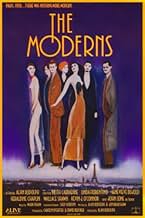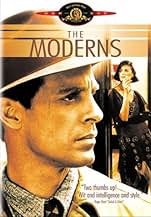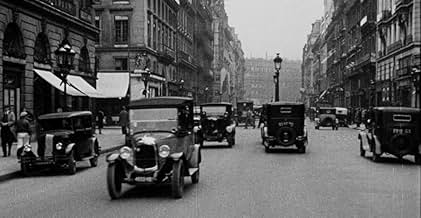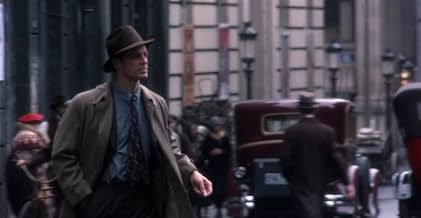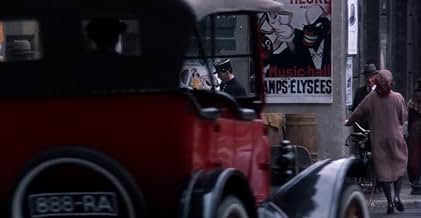AVALIAÇÃO DA IMDb
6,6/10
2,1 mil
SUA AVALIAÇÃO
Adicionar um enredo no seu idiomaA struggling artist is hired to forge paintings, causing him to cross paths with his ex-wife and her powerful new husband.A struggling artist is hired to forge paintings, causing him to cross paths with his ex-wife and her powerful new husband.A struggling artist is hired to forge paintings, causing him to cross paths with his ex-wife and her powerful new husband.
- Direção
- Roteiristas
- Artistas
- Prêmios
- 2 vitórias e 5 indicações no total
Geneviève Bujold
- Libby Valentin
- (as Genevieve Bujold)
Charlélie Couture
- L'Evidence
- (as Charlelie Couture)
Véronique Bellegarde
- Laurette
- (as Veronique Bellegarde)
- Direção
- Roteiristas
- Elenco e equipe completos
- Produção, bilheteria e muito mais no IMDbPro
Avaliações em destaque
This film is, first of all, a love story--but a remarkably surprising one, and by no means ordinary. It starts with the usual expectations most of us have about Paris that Woody Allen recently utilized so effectively in Midnight In Paris, but instead of broad comedy, Director Alan Rudolph weaves a fascinating tale of intrigue in the art world, and peppers it with wit and ambiguity.
The smoky Parisian ambiance of Bohemian Cafes (mostly created in Canada) introduce the viewer to Keith Carradine's stereotypical starving artist--except that Carradine's role is written to surprise, and one is drawn into a labyrinth of conflicting emotions very quickly indeed. This film, like Thieves Like Us, demonstrates what a fine under-utilized actor Carradine continues to be.
The feeling of elation that comes from escaping from one's cares in another place washes through every bar and café and art opening, and the performances from such vibrant actors as kinky Geraldine Chaplin and quirky Wallace Shawn--and especially the intensely cold and controlled and fascinating John Lone enliven the two hours that linger long after the film is finished.
The smoky Parisian ambiance of Bohemian Cafes (mostly created in Canada) introduce the viewer to Keith Carradine's stereotypical starving artist--except that Carradine's role is written to surprise, and one is drawn into a labyrinth of conflicting emotions very quickly indeed. This film, like Thieves Like Us, demonstrates what a fine under-utilized actor Carradine continues to be.
The feeling of elation that comes from escaping from one's cares in another place washes through every bar and café and art opening, and the performances from such vibrant actors as kinky Geraldine Chaplin and quirky Wallace Shawn--and especially the intensely cold and controlled and fascinating John Lone enliven the two hours that linger long after the film is finished.
Alan Rudolph does not make movies for everyone to see. His movies seem like personal projects that interest him at the time. Some of his movies I haven't been able to get involved in (Trixie, Mortal Thoughts, Afterglow) but with The Moderns, I was pulled in quickly. The story focuses on Keith Carradine's ex-patriot Nick Hart, a painter who has the ability to duplicate famous works of art with his brush. He's hired to create forgeries by Mademoiselle de Ville (Geraldine Chaplin).
But the story doesn't stop there. There are other ex-patriots around, including young Ernest Hemingway, comically portrayed by Kevin J. O'Connor; who is constantly drinking, philosophizing and pursuing women. It's not a flattering look at Hemingway, but somehow it adds to the whole ambience of the film and seems to ring true. And then there is Linda Fiorentino, a former lover of Nick's, and her husband, the rich and icy Bertram Stone (John Lone). The characters are odd and quirky, the story is uneven at times, and meanders a bit, but it is never boring. This movie has such style and depth that it pulls the viewer in, like we're trying to see the work that is under the painted canvas. That's what this movie is about -- the greater depth of art. What is art and what is crap? What is love and what is hate? What is real and what is illusion? As a director, Alan Rudolph pulls us along cleverly, with a hint of intrigue, the dichotomy of Nick's love and Hemingway's carousing, a taste of passion and the beauty of art. Then there are the characters who are well-layered works of art themselves. Maybe this movie isn't a masterpiece, but it leaves us chipping away at the paint trying to see what treasure is underneath. It's a movie to be enjoyed on many levels, just like a work of art.
But the story doesn't stop there. There are other ex-patriots around, including young Ernest Hemingway, comically portrayed by Kevin J. O'Connor; who is constantly drinking, philosophizing and pursuing women. It's not a flattering look at Hemingway, but somehow it adds to the whole ambience of the film and seems to ring true. And then there is Linda Fiorentino, a former lover of Nick's, and her husband, the rich and icy Bertram Stone (John Lone). The characters are odd and quirky, the story is uneven at times, and meanders a bit, but it is never boring. This movie has such style and depth that it pulls the viewer in, like we're trying to see the work that is under the painted canvas. That's what this movie is about -- the greater depth of art. What is art and what is crap? What is love and what is hate? What is real and what is illusion? As a director, Alan Rudolph pulls us along cleverly, with a hint of intrigue, the dichotomy of Nick's love and Hemingway's carousing, a taste of passion and the beauty of art. Then there are the characters who are well-layered works of art themselves. Maybe this movie isn't a masterpiece, but it leaves us chipping away at the paint trying to see what treasure is underneath. It's a movie to be enjoyed on many levels, just like a work of art.
A couple years ago I saw Trouble in Mind, and was immediately absorbed in the atmospheric world the film portrayed. I have since been dying to see another movie by the same director. Well, I've just seen the Moderns, and was immediately disappointed. While the film shares the same claustrophobic tendencies of the previous work, in this one it doesn't seem as deliberate, but more a matter of budgetary restraints. I never got the feeling that I was watching Paris, or 1920's Paris, for that matter. All I got was the sensation of watching stilted actors playing dress-up. The dialogue and plot for this movie is b-movie crust, which can be good, but the dreariness of the action and the way in which the film was filmed left it almost completely vacant of any charm. Cute references to pop culture from the 20's only sounds contrived and makes the film more apparent of what it isn't. One should get the feeling one is watching the 20's unfold without the crutch of references. We are never given any reason to care for any of the actors. They are cartoonish, but not cartoonish enough for them to be relieving and enjoyable. This movie takes itself far too seriously to be enjoyed as camp, which makes scenes involving fake suicide and real suicide all the more dour. The sets are perhaps more wooden than the characters, Hart's art atrocious. Hemmingway appears as a jocular Ethan Hawke ruffian, a pale shadow compared to Hart's masculinity. Lampooning famous people can be fine, but not when the only purpose of it is to rip them off and make them a clown with no real relevance to the story. I did, however, like the portrayal of Gertude Stein as a cliquish art snob. That's a more fair assessment. To be missed or slept through.
*****SPOILER ALERT!!!*****
Alan Rudolph's "The Moderns" is a wonderful, funny and twisted film set in 1920's Paris, France. The front burner story is a triangle between Nick, his runaway wife and a cold as ice businessman that wants to obtain a higher social status. Nick(Keith Carradine)and Rachel(Linda Fiorentino)were married years ago and she bails out of the marriage. Years later, she shows up on the arms of Bertram Stone (John Lone). While he deals with her reappearance, he is also talked into making art forgeries by a rather shady behaving gallery owner, Valentin(Genevieve Bujold), as a favor for the wealthy Nathalie De Ville(Geraldine Chaplin). His friend, Oiseau (Wallace Shawn)constantly tells Nick that they should head to a new town called Hollywood to seek their fortune and Ernest Hemingway (Kevin J. O'Connor)wanders around in a state of alcoholic cynicism and making quirky observations.
The story, like the period in which the action takes place, is surreal. One scene has one of the dead characters rise from the grave like Houdini, strait-jack, chains and all. The relationship between Nick and Rachel is the heart of the story: Nick doesn't want to trust Rachel because of what she did, but all of his actions throughout the film are a result of Rachel. When he paints the forgeries, he thinks of Rachel's beauty and puts his feelings on canvas. He loves her, but is fighting with the possibility that if he opens his heart to her again, she will break it again. You can see this conflict when he slaps her in front of Stone, yet immediately becomes apologetic. Should he love her, or should he just back off? He clearly does when they share a sexual romp on the bathroom floor while her husband is downstairs.
The entire cast is great, but the best performance comes from O'Connor, who I think is one of the most underrated actors around.
This is a great movie to have if you feel like having a Paris night movie marathon, or just to have fun.
Alan Rudolph's "The Moderns" is a wonderful, funny and twisted film set in 1920's Paris, France. The front burner story is a triangle between Nick, his runaway wife and a cold as ice businessman that wants to obtain a higher social status. Nick(Keith Carradine)and Rachel(Linda Fiorentino)were married years ago and she bails out of the marriage. Years later, she shows up on the arms of Bertram Stone (John Lone). While he deals with her reappearance, he is also talked into making art forgeries by a rather shady behaving gallery owner, Valentin(Genevieve Bujold), as a favor for the wealthy Nathalie De Ville(Geraldine Chaplin). His friend, Oiseau (Wallace Shawn)constantly tells Nick that they should head to a new town called Hollywood to seek their fortune and Ernest Hemingway (Kevin J. O'Connor)wanders around in a state of alcoholic cynicism and making quirky observations.
The story, like the period in which the action takes place, is surreal. One scene has one of the dead characters rise from the grave like Houdini, strait-jack, chains and all. The relationship between Nick and Rachel is the heart of the story: Nick doesn't want to trust Rachel because of what she did, but all of his actions throughout the film are a result of Rachel. When he paints the forgeries, he thinks of Rachel's beauty and puts his feelings on canvas. He loves her, but is fighting with the possibility that if he opens his heart to her again, she will break it again. You can see this conflict when he slaps her in front of Stone, yet immediately becomes apologetic. Should he love her, or should he just back off? He clearly does when they share a sexual romp on the bathroom floor while her husband is downstairs.
The entire cast is great, but the best performance comes from O'Connor, who I think is one of the most underrated actors around.
This is a great movie to have if you feel like having a Paris night movie marathon, or just to have fun.
Alan Rudolph does not make movies for everyone to see. His movies seem like personal projects that interest him at the time. Some of his movies I haven't been able to get involved in (Trixie, Mortal Thoughts, Afterglow) but with The Moderns, I was pulled in quickly. The story focuses on Keith Carradine's ex-patriot Nick Hart, a painter who has the ability to duplicate famous works of art with his brush. He's hired to create forgeries by Mademoiselle de Ville (Geraldine Chaplin).
But the story doesn't stop there. There are other ex-patriots around, including young Ernest Hemingway, comically portrayed by Kevin J. O'Connor; who is constantly drinking, philosophizing and pursuing women. It's not a flattering look at Hemingway, but somehow it adds to the whole ambience of the film and seems to ring true. And then there is Linda Fiorentino, a former lover of Nick's, and her husband, the rich and icy Bertram Stone (John Lone). The characters are odd and quirky, the story is uneven at times, and meanders a bit, but it is never boring. This movie has such style and depth that it pulls the viewer in, like we're trying to see the work that is under the painted canvas. That's what this movie is about -- the greater depth of art. What is art and what is crap? What is love and what is hate? What is real and what is illusion? As a director, Alan Rudolph pulls us along cleverly, with a hint of intrigue, the dichotomy of Nick's love and Hemingway's carousing, a taste of passion and the beauty of art. Then there are the characters who are well-layered works of art themselves. Maybe this movie isn't a masterpiece, but it leaves us chipping away at the paint trying to see what treasure is underneath. It's a movie to be enjoyed
But the story doesn't stop there. There are other ex-patriots around, including young Ernest Hemingway, comically portrayed by Kevin J. O'Connor; who is constantly drinking, philosophizing and pursuing women. It's not a flattering look at Hemingway, but somehow it adds to the whole ambience of the film and seems to ring true. And then there is Linda Fiorentino, a former lover of Nick's, and her husband, the rich and icy Bertram Stone (John Lone). The characters are odd and quirky, the story is uneven at times, and meanders a bit, but it is never boring. This movie has such style and depth that it pulls the viewer in, like we're trying to see the work that is under the painted canvas. That's what this movie is about -- the greater depth of art. What is art and what is crap? What is love and what is hate? What is real and what is illusion? As a director, Alan Rudolph pulls us along cleverly, with a hint of intrigue, the dichotomy of Nick's love and Hemingway's carousing, a taste of passion and the beauty of art. Then there are the characters who are well-layered works of art themselves. Maybe this movie isn't a masterpiece, but it leaves us chipping away at the paint trying to see what treasure is underneath. It's a movie to be enjoyed
Você sabia?
- CuriosidadesIsabella Rossellini screen-tested to play Nathalie DeVille, but lost to Geraldine Chaplin.
Principais escolhas
Faça login para avaliar e ver a lista de recomendações personalizadas
- How long is The Moderns?Fornecido pela Alexa
Detalhes
- Data de lançamento
- País de origem
- Idiomas
- Também conhecido como
- The Moderns
- Locações de filme
- Empresas de produção
- Consulte mais créditos da empresa na IMDbPro
Bilheteria
- Orçamento
- US$ 3.500.000 (estimativa)
- Faturamento bruto nos EUA e Canadá
- US$ 2.011.497
- Fim de semana de estreia nos EUA e Canadá
- US$ 20.283
- 17 de abr. de 1988
- Faturamento bruto mundial
- US$ 2.011.497
- Tempo de duração2 horas 6 minutos
- Cor
- Mixagem de som
- Proporção
- 1.85 : 1
Contribua para esta página
Sugerir uma alteração ou adicionar conteúdo ausente

Principal brecha
By what name was A Arte do Amor (1988) officially released in India in English?
Responda




